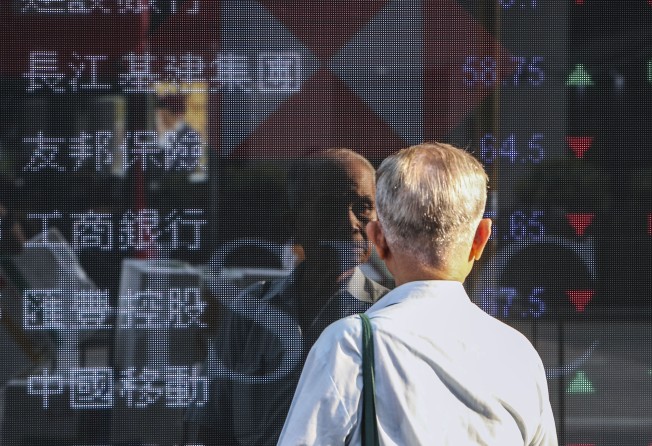Chinese investors fear missing out after US$9 billion in foreign inflows, push markets into positive territory
- Shanghai Composite Index rises by 0.68 per cent, Shenzhen Component Index rises by 1.15 per cent and Hang Seng Index rises by 0.1 per cent

Struck by the fear of missing out – or FOMO – following news that foreign investors ploughed a record US$9 billion into Chinese equities last month, domestic investors pushed all Chines indices into positive territory on Tuesday.
“Judging by the combined turnover of the Shanghai and Shenzhen indices of over 300 million yuan, domestic investors were buying A shares out of fear of missing out, after seeing strong foreign inflows in January into Chinese equities,” said Louis Wong Wai-kit, a director at Singapore-headquartered financial advisory company Philip Capital.
Traders said the trailing 12-month price-to-earnings ratios of Chinese blue chip stocks, as captured by the CSI 300 Index at 12.5 times, made these shares attractive, thus triggering the buying on Tuesday.
The Shanghai Composite Index rose by 0.68 per cent, or 18 points, to 2671.89, while the Shenzhen Component Index rose by 1.15 per cent, or 91 points, to 8,101.07. The turnover for the latter index improved from Monday to 208.4 billion yuan (US$30.7 billion), higher than the 156.7 billion yuan traded in Shanghai. In Hong Kong, the Hang Seng Index rose by 0.1 per cent, or 27.49 points, to 28,171.33, after the gauge recouped some of the losses made during the morning session. The turnover on its main board was HK$96 billion (US$12.2 billion).
Pharmaceutical stocks supported indices in mainland China as well as Hong Kong after the Chinese State Council said on Monday 21 types of drugs for rare diseases and four active pharmaceutical ingredients would be given preferential tax treatment. In Shanghai, Kangmei Pharmaceutical rose by 10 per cent to 7.36 yuan and Huadong Medicine rose by 7.16 per cent to 30.82 yuan. In Hong Kong, Sino Biopharm rose by 1.56 per cent to HK$35.9 and CSPC Pharmaceutical rose by 5.46 per cent to HK$13.92.
Automobile stocks did well too, with Geely Automobile rising by 4.37 per cent to HK$14.34 after the company reported record sales in January of 158,393 cars, a 70 per cent increase over December 2018. It was the fifth most traded stock, with HK$2.02 billion in shares changing hands on Tuesday.
Together, the automobile and pharmaceutical sectors pulled up the Hang Seng China Enterprise Index, or the H-share gauge, by 0.25 per cent, or 27.72 points, to 11,044.65.
The Shanghai Composite Index was also boosted by Foxconn Industrial Internet, which rose by 3.21 per cent to 12.54 yuan, after international index compiler MSCI said the stock had been added to its Emerging Markets Index after a quarterly review.
However, the upcoming round of trade talks between the United States and China could yet reverse the sentiment supporting the markets thus far this week.
Chinese Vice-Premier Liu He and People’s Bank of China governor Yi Gang will meet US Trade Representative Robert Lighthizer and US Treasury Secretary Steven Mnuchin on Thursday and Friday. The markets are hoping the discussions lead to an extension of the March 1 deadline, after which US tariffs on Chinese imports worth US$200 billion will rise from 10 per cent to 25 per cent, or a meeting between Chinese President Xi Jinping and his US counterpart, Donald Trump.